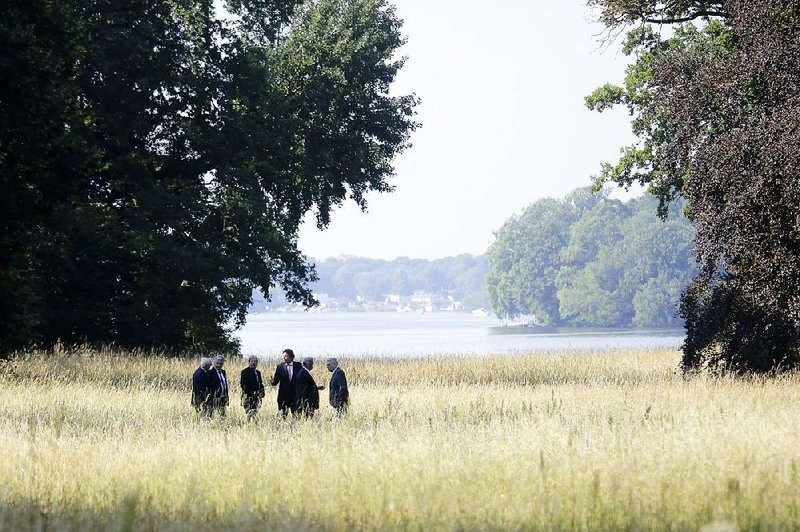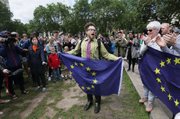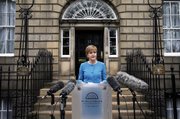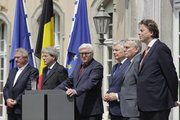BERLIN -- Foreign ministers of the European Union's founding members on Saturday urged quick negotiations about Britain's departure from the bloc, saying the other 27 countries in the union need to move ahead and think about the future.
RELATED ARTICLE
http://www.arkansas…">Future uncertain for EU immigrants in Britain
"There is a certain urgency ... so that we don't have a period of uncertainty, with financial consequences, political consequences," Foreign Minister Jean-Marc Ayrault of France said.
He spoke alongside counterparts from the other five founding members of what has become the EU -- Germany, Italy, the Netherlands, Belgium and Luxembourg -- after they met in Berlin. Top EU officials and leaders have been scrambling to draft a blueprint for what has never before happened: the withdrawal of an EU member state.
The leaders on Saturday also accepted a degree of criticism that the EU in recent times did not show the energy and courage needed to work together on important topics such as migration, unemployment and terrorism.
German Foreign Minister Frank-Walter Steinmeier also said negotiations on a British exit should begin "as soon as possible" and added that "intensive European discussions" are needed.
Luxembourg's Foreign Minister Jean Asselborn said he hoped that there would be no "cat-and-mouse" game now and that Britain would invoke Article 50 of the EU charter, which would officially start the exit process.
"There must be clarity," Asselborn told reporters. "The people have spoken, and we need to implement this decision."
German Chancellor Angela Merkel, speaking at a different news conference, in Potsdam, outside Berlin, also prodded for British action.
"To be honest, it shouldn't take forever, that's right -- but I would not fight over a short period of time," Merkel said, adding that Britain will "remain a close partner," including through economic ties and membership in the North Atlantic Treaty Organization.
The British side is much more relaxed. Prime Minister David Cameron is resigning and says his successor, to be chosen by October, should start the formal exit process.
All six foreign ministers agreed that Europe needs to do more to address pressing matters such as the migration crisis, unemployment and security concerns after the terror attacks in France and Belgium.
"We did not have the energy, the power, and perhaps the braveness, to make the necessary decisions, and this we must now show in Europe -- that we are in a position to make decisions, especially in difficult fields like migration," Steinmeier said.
In a joint statement, the leaders said they need to find ways to better deal with the different levels of ambition in regard to the European integration and that they need to make sure that Europe will be better at fulfilling the expectations of all citizens.
Ayrault urged the remaining 27 EU countries to return to "the spirit of the founders" of European unity, forged to prevent conflict by means of trade after World War II.
"It is up to us to re-create this spirit," he said, noting all the European countries that subsequently joined after overthrowing dictatorships and embracing democracy.
Jean-Claude Juncker, president of the European Commission, warned in German daily Bild on Saturday that other countries may also call for referendums to leave the EU.
"The populists will not leave out this opportunity to promote their anti-Europe politics with much noise," Juncker said.
At the same time, he said the consequences the British people now face could put a stop to such sentiment, asserting, "It should show quickly that Great Britain did better in the EU -- economically, socially and when it comes to foreign politics," Juncker said.
The foreign ministers' Saturday meeting came as governments from Dublin to Paris to Berlin confronted their worst-case scenarios. On Friday, top leaders of the union's executive and legislative branches met in Brussels while all 28 EU ambassadors convened in the afternoon in Luxembourg.
The rounds of diplomacy were laying the groundwork for a previously planned EU summit Tuesday, when the highest-level talks by national leaders will begin on how to handle the process of a British exit.
Referendum redo push
By Saturday, more than 2.1 million people in Britain had joined an online petition urging the government to hold a second referendum on membership in the European Union.
The petition to Parliament said the government should "implement a rule that if the remain or leave vote is less than 60 percent, based a turnout less than 75 percent, there should be another referendum."
A majority of 52 percent voted to leave, with a turnout of 72 percent of the 46.5 million eligible voters.
Parliament is obliged to "consider for a debate" all petitions attracting more than 100,000 signatures.
Leading campaigners in the debate before Thursday's referendum, including Cameron, a staunch "Remain" campaigner, said a second referendum would not be possible.
Labor Party lawmaker David Lammy on Saturday called on Parliament to "stop this madness" and vote against the referendum decision to leave the EU.
"Wake up. We do not have to do this. We can stop this madness through a vote in Parliament," he said in a statement posted on Twitter. "The Leave campaign's platform has already unravelled and some people wish they hadn't voted to Leave."
A separate petition signed by more than 148,000 urges London Mayor Sadiq Khan to declare the city independent from Britain and join the EU.
"London is an international city, and we want to remain at the heart of Europe," said the petition on change.org, initiated by London-based journalist James O'Malley.
Meanwhile, Jeremy Corbyn, the leader of the Labor Party, which is the main opposition party, said he'd run again for the post if he faces a challenge from another lawmaker.
"Yes, I'm here," Corbyn said in response to a reporter's question after a speech in London on Saturday when he was asked if he'd contest another leadership election. He cited a petition backing him signed by more than 140,000 people.
Senior Labor lawmakers have blamed Corbyn for failing to galvanize enough party support to thwart Britain's vote to leave the EU in the referendum. A motion of no confidence in his leadership was submitted Friday by two members of the House of Commons, Ann Coffey and Margaret Hodge, for consideration at the parliamentary party's weekly meeting on Monday evening.
Stirrings in Scotland
In Scotland, First Minister Nicola Sturgeon said Saturday that her government started work on legislation for a new referendum on independence after the United Kingdom as a whole voted to quit the European Union and Scotland voted to remain.
Speaking after an emergency meeting of her Cabinet in Edinburgh, Sturgeon said she will also be seeking talks with European leaders and the institutions of the EU about ways of continuing Scotland's relationship with the bloc. The semiautonomous government will appoint a panel of advisers in coming weeks and convene a meeting of consuls from EU member states.
"A second independence referendum is clearly an option that requires to be on the table, and it is very much on the table; to ensure that option is a deliverable one in the required timetable, steps will be taken now to ensure the necessary legislation is in place," Sturgeon said in a televised statement outside her official Bute House residence. "We are determined to act decisively, but in a way that builds unity across Scotland about the way forward."
Immediately after the vote, questions were raised about the future integrity of the U.K. less than two years after Scots last voted on independence, deciding 55 percent to 45 percent to stay in the 3-centuries-old union with England.
The prospect of another vote dominated Scottish media on Saturday. The front page of the Daily Record, the top-selling newspaper, declared "EU, Go Girl!' and said Sturgeon had no choice but to call another vote. The Herald said on its front page that Scotland is on course for a referendum within two years.
The British exit is one of the game changers Sturgeon and her Scottish National Party have said would prompt them to push again for full autonomy. Another was a turn in the polls to show a clear majority would back independence. Before the EU referendum, a survey by market researcher TNS showed the country of 5.4 million was split roughly as it was in the 2014 independence vote.
During the last independence referendum, the difficulty of joining the EU after secession was used as a threat by pro-union campaigners, including Cameron. Scotland is now reaching out to Brussels and EU diplomats to ensure that doesn't happen again.
"We will seek to enter into immediate discussions with EU institutions and EU member states to explore all possible options to protect Scotland's place in the EU," Sturgeon said. She also sought to reassure the business community that "Scotland is, and will continue to be, an attractive and stable place to do business."
The "Leave" campaign across most of the U.K. barely touched Scotland. Political leaders were united in staying in the EU. In the end, 62 percent of voters backed "Remain," with 38 percent favoring "Leave." Britain as a whole voted 52 percent to 48 percent to go it alone after 43 years of membership in the bloc.
Elsewhere, Jonathan Hill, sent to Brussels by Cameron less than two years ago, resigned as the EU's financial-services chief in the wake of the U.K.'s vote.
"As we move to a new phase, I don't believe it is right that I should carry on as the British commissioner as though nothing had happened," Hill said in an emailed statement Saturday. Hill, who called for the U.K. to remain in the EU, said he would work in the weeks ahead to ensure an "orderly hand-over."
Juncker, the European Commission president, said he had put Hill in the finance post "as a sign of my confidence in the United Kingdom's membership of the European Union" but the "situation is now changing." Hill's duties will be taken on by the Latvian Valdis Dombrovskis, currently a vice president of the commission.
The European Parliament called for Hill's removal within hours of the U.K. referendum result.
Elmar Brok, a German member of the assembly, said Friday that a British commissioner "shouldn't be making the rules for financial services if Britain is leaving." Deciding to quit the EU "has to have consequences," he said, "and this is an area that's of particular interest to the U.K."
Information for this article was contributed by Kirsten Grieshaber and David Rising of The Associated Press; by Anthony Faiola of The Washington Post; by Arne Delfs, Thomas Penny, Patrick Henry, Rodney Jefferson, Ian Wishart, Aoife White, Joe Mayes and Silla Brush of Bloomberg News; and by staff members of Deutsche Presse-Agentur.
A Section on 06/26/2016




